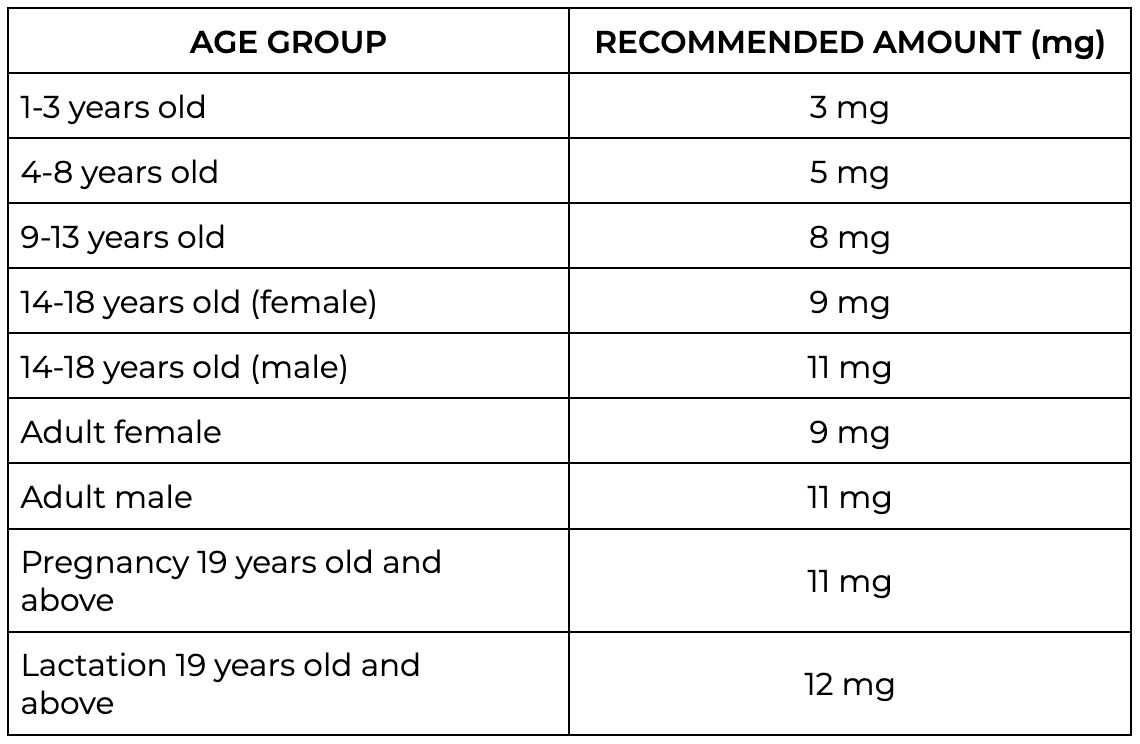Zinc: The Mighty Mineral with Health Benefits for Children and Adults
Written by:
Maria Katrina M. Florcruz-Dacanay, MD, FPPS

What is Zinc?
Zinc is a mineral of nutritional importance found throughout the body. It is among the most abundant trace mineral in the body next to iron. Only small amounts of zinc are needed, but it is required by hundreds of enzymes for important reactions. Zinc is also vital for immunity, wound healing, blood clotting, metabolism, and growth.[1,2]
Zinc is an essential nutrient, which means that the body cannot produce it and needs to get it from the daily diet. Zinc supplements, such as zinc gluconate, may also help those with a deficiency in this mineral.
ROLES AND BENEFITS OF ZINC
Growth and Development
Zinc is important for cell growth and division. It plays a major role in building DNA and proteins. It also aids in healing damaged tissues.[1,3]
Zinc is necessary during pregnancy to support the proper growth of the fetus, prevent birth complications, and aid in milk production during lactation. Zinc is important during the first year of life which is a period of rapid growth and development.[4]
Immunity
Zinc supports the normal function of various cells that are important for immunity and protection against viruses and bacteria. It is also known to have antioxidant and anti-inflammatory properties.
Deficiency in zinc is linked with several infectious diseases including respiratory infections, malaria, HIV, and tuberculosis.[1,5]
Diarrhea Management
Supplementation of zinc has been shown to help reduce the duration and severity of diarrheal episodes.
The World Health Organization and the UNICEF recommend supplementation of 20 mg of zinc per day for 10 to 14 days for children with diarrhea and 10 mg per day for infants below 6 months.[6]
Protection Against Respiratory Infection
Studies show that zinc had antioxidant and antiviral effects. Zinc is associated with the prevention and shortening of the duration of symptoms of respiratory infections such as pneumonia and common colds.
Zinc helps protect against the progression of certain lung diseases such as chronic obstructive pulmonary disease (COPD). Zinc supplementation may also have therapeutic effects on asthma.[7,8]
Wound Healing
Zinc is needed by the body for collagen and tissue production. It also aids in healing inflamed wounds.
Zinc supplementation, along with other nutrients like protein, Vitamin C, and L-arginine, promotes wound healing for patients with decubitus ulcers and burns.[1]
SIGNS OF ZINC DEFICIENCY
Zinc deficiency can affect the different tissues and organs in the body. A deficiency of zinc in children can cause various health problems such as loss of appetite, weight loss, stunted growth, and diarrhea. It can also cause weakened immunity and impaired resistance against infections. Older children may experience hair loss and reproductive problems by the time they are adults.[4,9]
In adults, signs of zinc deficiency can also include diarrhea, hair loss, loss of taste or smell, loss of appetite, changes in mood, weak immunity, and delayed wound healing. Pregnant women who do not get enough zinc are at risk of preterm birth and having offspring with low birth weight.[1,9]
HOW MUCH ZINC DO I NEED?
The recommended daily allowance for zinc is as follows[9]:

SOURCES OF ZINC
One can get zinc from the daily diet. Food sources rich in zinc include fish and seafood like crabs and lobsters. Oysters have the highest amount of zinc. Meat like beef, poultry, and pork are good sources of zinc. Dairy products such as eggs, yogurt, and cheese have zinc. Beans, nuts, and whole grains also have zinc. Zinc is also available as a dietary supplement and can have different forms such as zinc gluconate.[9]

ZINC GLUCONATE SUPPLEMENTATION
While zinc deficiency impairs the immune system, supplementation of zinc can help lower the risk of diseases like diarrhea and respiratory infection. In studies, zinc supplementation in children helped reduce the incidence of diarrhea by 18% and its duration by 15%. Zinc also helps decrease the incidence of pneumonia by 41%.[4,10]
Zinc gluconate supplementation has been shown in studies to help reduce the duration and symptoms of the common cold. 11 Compared to other forms of zinc supplements, zinc gluconate has better absorption and is a useful alternative for preventing zinc deficiency.[12]
Zinc is an essential mineral with valuable roles in one’s health for both children and adults. It strengthens the immune system, blood health, and metabolism. Zinc helps protect against infection, diarrhea, and pneumonia. Zinc positively influences proper growth, development, and cognition. A diet rich in zinc can prevent deficiency in this mighty mineral. When needed, zinc gluconate supplementation is a useful adjunct in preventing deficiency and reducing the risk and duration of diseases like diarrhea and pneumonia.
References:

